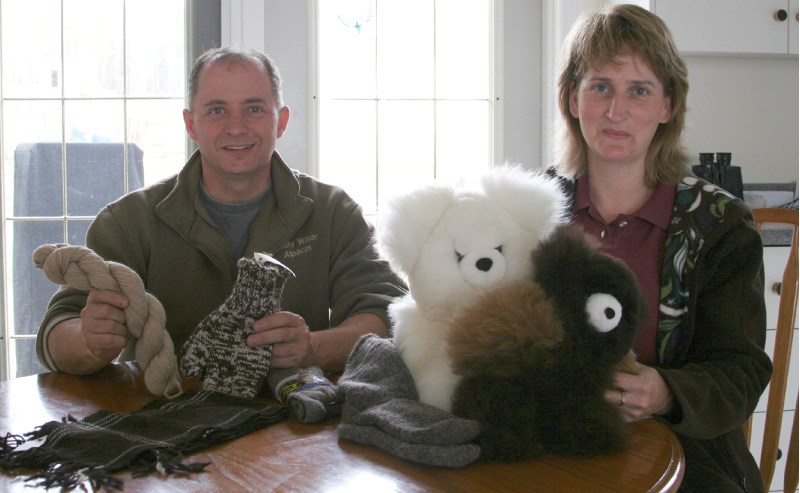Larry and Therese Scott moved to the Lakeland in 2002 and decided to raise alpacas. They named their acreage Misty Water Alpacas, because of the mist that rises from a nearby water body, and say the animal was the right choice.
Alpacas originate in South America and were introduced in Canada 20 years ago. The animals range from 22 shades of colour, variations of white, brown, black or grey.
“They're fairly simple to take care of. They don't need a lot of cleared land, so it was right for our farm,” says Therese.
The alpacas are sheered once a year on the Scotts' acreage. The fibre is sent to Twisted Sisters, a mill near Leduc, for processing into yarn, while alpaca wool socks are made in Innisfail.
Alpacas have three stomachs, making them an economical animal to maintain.
“They get a lot more mileage on hay than a horse would,” Larry explains. “You could feed them cheaper than a medium or a large sized dog.” He estimates it costs around six dollars a month to feed an alpaca.
“It's a nice way of life and they pay for themselves,” Therese says. Around 20,000 alpacas call Canada home now, many of them registered with Alpaca Canada's 140 farms.
Alpacas are mild-tempered and curious animals and are smaller than a llama.
As a docile animal, alpacas are relatively easy to halter train, but may decide to spit at each other if one is giving another unwanted attention.
Larry also operates an alpaca shearing business. He travels around Alberta and Saskatchewan to provide the service while not on duty with the Canadian Reserves at 4 Wing. Before joining the Reserves Larry was employed full time with the military.
Sheared once a year, an average alpaca can produce four pounds of prime fibre and six pounds of lower grade fibre. The softest wool can sell for $45 a pound while the courser wool sells for less.
Misty Water Alpacas sells the finished product at craft shows and from the Scott home.
Prime alpaca wool is softer and warmer than sheep wool, making it a unique niche market. Another difference is that alpaca wool doesn't contain lanolin and is hypoallergenic.



